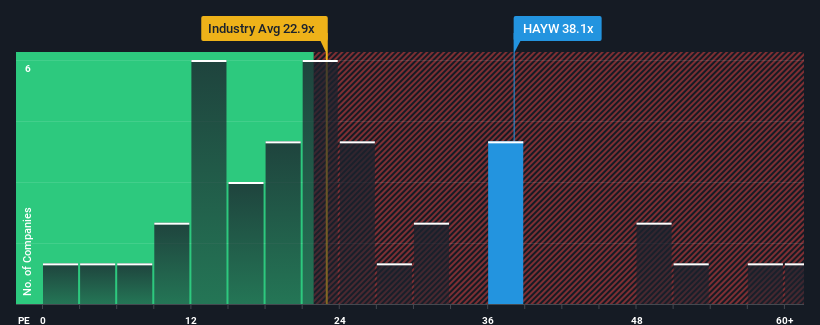- United States
- /
- Building
- /
- NYSE:HAYW
Hayward Holdings, Inc.'s (NYSE:HAYW) P/E Still Appears To Be Reasonable

Hayward Holdings, Inc.'s (NYSE:HAYW) price-to-earnings (or "P/E") ratio of 38.1x might make it look like a strong sell right now compared to the market in the United States, where around half of the companies have P/E ratios below 16x and even P/E's below 9x are quite common. Nonetheless, we'd need to dig a little deeper to determine if there is a rational basis for the highly elevated P/E.
With earnings that are retreating more than the market's of late, Hayward Holdings has been very sluggish. One possibility is that the P/E is high because investors think the company will turn things around completely and accelerate past most others in the market. If not, then existing shareholders may be very nervous about the viability of the share price.
See our latest analysis for Hayward Holdings

How Is Hayward Holdings' Growth Trending?
There's an inherent assumption that a company should far outperform the market for P/E ratios like Hayward Holdings' to be considered reasonable.
If we review the last year of earnings, dishearteningly the company's profits fell to the tune of 54%. However, a few very strong years before that means that it was still able to grow EPS by an impressive 50% in total over the last three years. Accordingly, while they would have preferred to keep the run going, shareholders would probably welcome the medium-term rates of earnings growth.
Turning to the outlook, the next three years should generate growth of 26% per annum as estimated by the ten analysts watching the company. With the market only predicted to deliver 11% per year, the company is positioned for a stronger earnings result.
In light of this, it's understandable that Hayward Holdings' P/E sits above the majority of other companies. Apparently shareholders aren't keen to offload something that is potentially eyeing a more prosperous future.
What We Can Learn From Hayward Holdings' P/E?
Using the price-to-earnings ratio alone to determine if you should sell your stock isn't sensible, however it can be a practical guide to the company's future prospects.
We've established that Hayward Holdings maintains its high P/E on the strength of its forecast growth being higher than the wider market, as expected. Right now shareholders are comfortable with the P/E as they are quite confident future earnings aren't under threat. Unless these conditions change, they will continue to provide strong support to the share price.
You need to take note of risks, for example - Hayward Holdings has 2 warning signs (and 1 which can't be ignored) we think you should know about.
If P/E ratios interest you, you may wish to see this free collection of other companies with strong earnings growth and low P/E ratios.
Valuation is complex, but we're here to simplify it.
Discover if Hayward Holdings might be undervalued or overvalued with our detailed analysis, featuring fair value estimates, potential risks, dividends, insider trades, and its financial condition.
Access Free AnalysisHave feedback on this article? Concerned about the content? Get in touch with us directly. Alternatively, email editorial-team (at) simplywallst.com.
This article by Simply Wall St is general in nature. We provide commentary based on historical data and analyst forecasts only using an unbiased methodology and our articles are not intended to be financial advice. It does not constitute a recommendation to buy or sell any stock, and does not take account of your objectives, or your financial situation. We aim to bring you long-term focused analysis driven by fundamental data. Note that our analysis may not factor in the latest price-sensitive company announcements or qualitative material. Simply Wall St has no position in any stocks mentioned.
About NYSE:HAYW
Hayward Holdings
Designs, manufactures, and markets a portfolio of pool equipment and associated automation systems in North America, Europe, and internationally.
Solid track record and slightly overvalued.
Market Insights
Community Narratives




